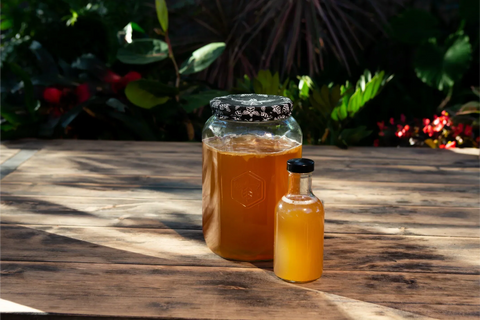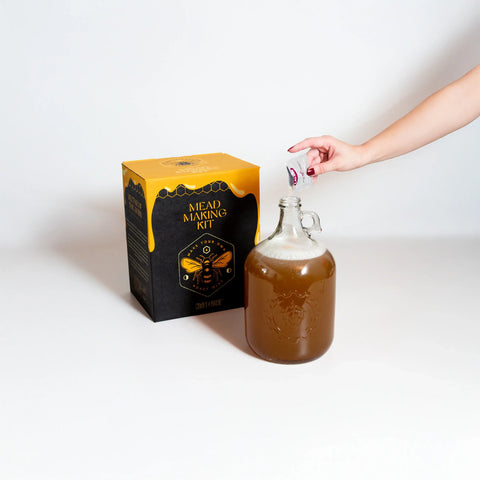TL;DR:
-
The best temperature for kombucha is 75–85°F (24–29°C).
-
Don’t ferment kombucha too cold (<68°F / 20°C): slows yeast and bacteria, creating flat, overly sweet kombucha. Increases risk of mold growth.
-
Don’t ferment kombucha too hot (>90°F / 32°C): stresses the SCOBY, speeds fermentation, and can cause harsh flavors or even kill cultures.
-
Maintaining consistent kombucha brewing temperature = balanced acidity, fizz, and flavor.
-
Use heating wraps, insulated jars, or thermometers to keep your brew in the ideal range.
Why Temperature Matters in Kombucha Brewing
When learning how temperature affects kombucha it’s important to remember: your SCOBY isn’t just an ingredient — it’s alive. This symbiotic culture of bacteria and yeast thrives in and requires a consistent warm temperature range. Step outside that comfort zone and things can go wrong.
At the right kombucha fermentation temperature, yeast converts sweetened tea into alcohol and CO₂ (carbon dioxide that makes kombucha fizzy).
Bacteria convert that alcohol into organic acids, which deliver the tart bite and acidify the kombucha to protect against mold.
The balance between the two is what gives kombucha its signature tang, effervescence, and complexity.
If your brew is too cold or too hot, that balance breaks down.
The Ideal Temperature Range for Kombucha
The best temperature for kombucha is 75–85°F (24–29°C).
Why this range matters:
-
Both yeast and bacteria work in harmony.
-
Fermentation typically completes in 7–14 days, depending on your taste preference.
-
pH drops (becomes more acidic) quickly enough to prevent contamination.
-
The SCOBY stays healthy and keeps producing strong brews for future batches.
👉 A note on room temperature kombucha brewing: Most homes sit around 70°F, which can work, but cooler rooms may slow fermentation. That’s where temperature control for kombucha comes in.
Explore Craft a Brew’s Kombucha Starter Kits — designed to thrive at typical home conditions, with tips included for keeping your SCOBY happy.
What Happens When You Ferment Kombucha Too Cold?
Cold conditions = sluggish microbes. If your kombucha ferments below 70ºF (21°C):
-
Yeast slows down, resulting in slow or stalled fermentation.
-
Sugars don’t get fermented out, leaving kombucha overly sweet
-
pH doesn’t drop quickly, increasing risk of mold growth.
Signs your kombucha is too cold:
-
No change in clarity. Kombucha will become hazy during fermentation due to yeast activity.
-
No new SCOBY layer developing at the surface. Healthy fermentation produces a new pellicle after about 5-7 days.
-
Kombucha tastes like sweet tea instead of tangy kombucha. This indicates that yeast aren’t converting the sugar into alcohol, acids & carbonation.
👉 Solution: Wrap your jar in a towel for insulation, or use a heating wrap to nudge temps into the right zone.
What Happens When You Ferment Kombucha Too Hot?
On the flip side, heat can push things out of balance. If your kombucha ferments above 90°F (32°C):
-
Fermentation may finish in just a few days, but flavor and health of the culture will suffer.
-
SCOBY may weaken or develop fuzzy kahm yeast.
Result: harsh vinegar-like kombucha or even a ruined SCOBY.
Tips for Controlling Kombucha Fermentation Temperature
Even if your house runs hot in summer or cold in winter, you can maintain the ideal kombucha fermentation conditions with a few simple tools:
-
Pick the Right Spot
-
Keep your jar in a warm, stable area away from direct sunlight.
-
Avoid cupboards or pantries — kombucha needs airflow.
-
Insulate
-
Wrap the jar in a towel to help retain warmth during cooler months.
-
Use a Heat Source if Needed
-
A kombucha heating wrap, brew belt, or seedling mat can provide consistent warmth.
-
Adjustable settings let you dial in the best temperature for kombucha year-round.
-
Monitor with a Fermometer
-
Stick-on thermometers (like our Fermometer) make it easy to track your brew without guesswork.
Final Thoughts: Mastering Kombucha Temperature
Getting kombucha brewing temperature right is the secret to consistent, delicious results. Aim for 75–85°F, adjust for your home’s climate, and use simple tools to stabilize your brew.
Whether your kitchen runs chilly in winter or sweltering in summer, knowing how temperature affects kombucha means you’ll never be surprised by a too-sweet or overly tart batch again.
👉 Ready to perfect your setup? Check out Craft a Brew’s Kombucha Starter Kits and Temperature Control Accessories to keep your SCOBY in the sweet spot.





